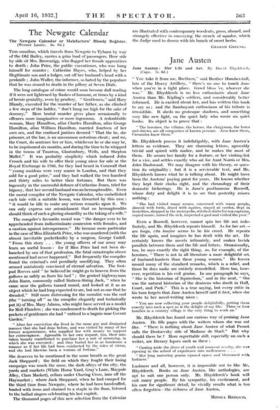The Newgate Calendar
The Newgate Calendar or Malefactors' Bloody Register.
(Werner Laurie. Ss. 6d.)
Tins omnibus, which travels from Newgate to Tyburn by way of the Old Bailey, carries a grim load of passengers. Here side by side sit Mrs. Brownrigg, who flogged her female apprentices to death ; John Price, the public executioner, who was hung himself for murder ; Catherine Hayes, who, helped by her illegitimate son and a lodger, cut off her husband's head with a penknife ; John Waller, the informer, so hated by the populace that he was stoned to death in the pillory at Seven Dials.
The long catalogue of crime would soon become dull reading if it were not lightened by flashes of humour, at times by a kind of heroic geniality, even by prudery. "Gentlemen," said Mary Blandy, executed for the murder of her father, as she climbed a few steps of the ladder, "don't hang me high for the sake of decency." Mere brutal murder gives place occasionally to offences more imaginative or more ingenuous. A redoubtable woman, Mary Hamilton, alias Charles Hamilton, alias George Hamilton, alias William Hamilton, married fourteen of her own sex, and the confused justices decreed "That the he, she prisoner, at the bar, is an uncommon notorious cheat ; and we, the Court, do sentence her or him, whichever he or she may be, to be imprisoned six months, and during the time to be whipped in the towns of Taunton, Glastonbury, Wells, and Shepton Mallet." It was probably simplicity which induced John Crouch and his wife to offer their young niece for sale at the Royal Exchange in 1766, for they had heard in Cornwall that "young maidens were very scarce in London, and that they sold for a good price," and they had walked the two hundred and thirty miles to better their fortunes. But there was ingenuity in the successful defence of Catherine Jones, tried for bigamy, that her second husband was an hermaphrodite. Even the moral compiler of the Newgate Calendar, who embellished each tale with a suitable lesson, was thwarted by this case : "it would be idle to make any serious remarks upon it. We can only express our astonishment that an hermaphrodite should think of such a glaring absurdity as the taking of a wife."
The compiler's favourite moral was "the danger ever to be apprehended from indiscriminate connexion with females, and a caution against intemperance." He became more particular in the case of Miss Elizabeth Price, who was murdered (with the almost inevitable pocketknife) by a surgeon, George Cadell. "From this story . . . the young officers of our army may learn an useful lesson : for if Miss Price had not been de- bauched by one of that profession, the fatal catastrophe above mentioned had never happened." But frequently the compiler found the criminal's end peculiarly unedifying. They often seemed mistakenly convinced of eternal salvation. The foot- pad Reeves said "lie believed he might go to heaven from the gallows as safely as front his bed" ; the genteel highwayman John Mann, commonly called Sixteen-String Jack, "when he came near the gallows turned round, and looked at it as an object which he had long expected to see, but not as one that he dreaded." Still more distressing for the moralist was the end (the "turning off" as the compiler elegantly and technically put it) of Mrs. Mary Adams, who might have served as a model for Moll Flanders ; she was condemned to death for picking the pockets of gentlemen she had" enticed to a bagnio near Covent Garden."
"After her conviction she lived in the same gay and dissipated manner that she had done before, and was visited by many of her former acquaintance, who supplied her with money to support her extravagance. Agreeable to her own request, too, their mis- taken bounty contributed to purchase her a suit of mourning, in which she was executed ; and they buried her in as handsome a manner as if her life had been conducted by the rules of virtue, and she had likewise been a woman of fortune."
She deserves to be mentioned in the same breath as the great Jack Sheppard ; the field on which they fought their losing campaign was much the same, the dark alleys of the city, the yards and markets (White Horse Yard, Gray's Lane, Maypole Alley, Clare Market), cellars under Charing Cross, inns off the Haymarket ; where Jack Sheppard, when he bad escaped for the third time from Newgate, where he had been handcuffed, loaded with irons and chained to a staple in the floor, listened to the ballad singers celebrating his last exploit.
The thousand pages of this new selection from the Calendar are illustrated with contemporary Woodcuts, gross, absurd, and strangely effective in conveying the stench of squalor, which the Judge used to drown with his bunch of sweet herbs.
GRAHAM GREENE.








































 Previous page
Previous page